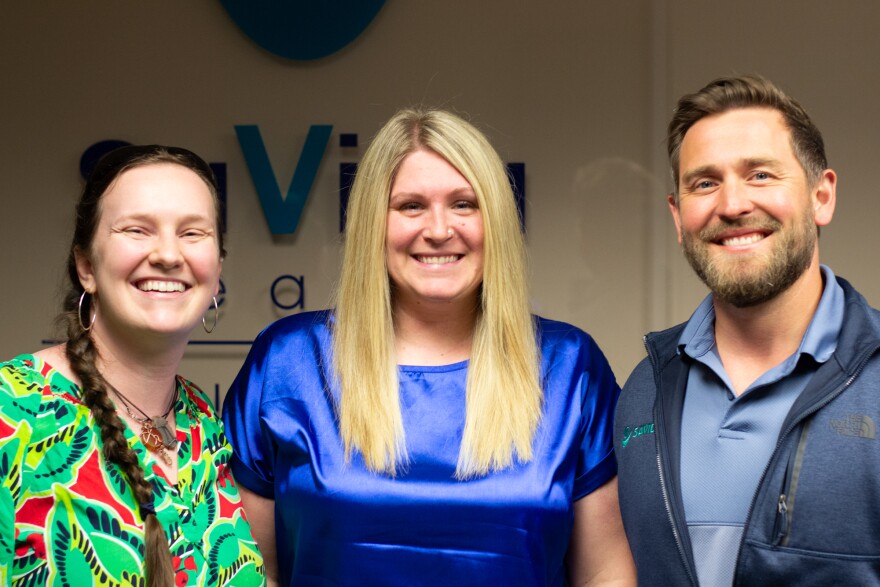An addiction treatment provider has opened new locations in Harrisonburg, Woodstock, and Waynesboro in recent months. WMRA's Randi B. Hagi has the story.
SaVida Health's new outpatient clinic in Harrisonburg is tucked away in a quiet office building on Neff Avenue. One day in late May, Area Manager Tabytha Brown gave me a tour.
TABYTHA BROWN: This is our lab, our intake room, so in here, this is where we get the patients' vitals, temperature, O2, blood pressure, and then we also have a bathroom right here where we collect their urine. [footsteps] Right, and then back through here, this is the counselor's office.
The clinic offers medication-assisted treatment for opioid, alcohol, and stimulant use disorders, coupled with mental healthcare and other services.
KYLE JONES: We try to take a comprehensive approach to treating addiction.
Kyle Jones is a psychiatric nurse practitioner.
JONES: We have the MAT side of things, which is medication-assisted treatment. We have the other, counseling, side, so those two are probably the core of our treatment, but we also offer other services, including psychiatric care – so managing comorbid mental health diagnoses. We do general health screening.
ANNA WYKES: If somebody walks in and they have opiate use disorder, but they also suffer from depression and anxiety, that's alright. We can treat that as well.
Anna Wykes is a behavioral health provider who holds counseling sessions with SaVida patients. Counseling is a required part of their program – either with the staff in-house, or another organization, like a patient's primary healthcare provider. SaVida may prescribe one of a variety of medications, such as Suboxone and Vivitrol, for the substance use disorder.
The Substance Abuse and Mental Health Services Administration, or SAMHSA, explains that these medications can block or blunt the euphoric effects of drugs or alcohol, reduce symptoms of withdrawal, reduce cravings, or cause a negative physical reaction when alcohol is consumed, thus deterring drinking.
WYKES: I try to break it down for people when people say, "well, what is medication-assisted treatment?" You know, medication is the assistant, and the therapy is the counseling, but you need both together for it to work.
Wykes came to the mental health field from a job in corrections, where she saw the need for addiction treatment.
WYKES: And I didn't feel I could give them the treatment and the services and the assistance that they needed in the role I was at in corrections. I really needed to service it in a way where it's outpatient. Nobody forces you to come here. You come here willingly, and so I can help anybody who's coming in the door.

This is one of 55 SaVida clinics across seven states. The company functions as a network, with providers and counselors conducting telehealth appointments for patients at other clinics when their local staff is booked or unavailable. On their social media, SaVida announced 18 newly opened clinics over the past 15 months, and Chief Growth Officer Andy Ward said they're continuing to expand.
ANDY WARD: We now have seven centers in the Shenandoah Valley, from Staunton, Waynesboro, Harrisonburg, Woodstock, Luray, Front Royal, and Winchester. … We have 28 centers serving Virginia communities today, and we will certainly be increasing that number in the next year or so.
Ward explained that they sometimes look at CDC and state data to identify areas with opioid problems that may need more treatment providers. Around here, though, they saw the demand themselves.
WARD: You know, we started noticing that patients were coming to us from further away. There was perhaps a lack of services in some of the communities.
Their very first clinic was founded in western Massachusetts in 2017. Ward credited the Virginia Medicaid system, a.k.a. The Department of Medical Assistance Services, or DMAS, for enabling them to expand in the commonwealth.
WARD: I think Virginia, more than … certainly, any other state that we're in, has leaned into trying to solve the opioid epidemic, and has created a very reasonable structure for medication-assisted treatment providers and addiction treatment providers to operate in.
The majority of their patients are on Medicaid, although they also accept Medicare and most private insurers. Medicaid enrollment in Virginia has grown from 1.1 million people to nearly 1.8 million over the last five years. That's in part because of the 2019 expansion of who was eligible for benefits, and the pandemic-era continuous coverage period, when states couldn't revoke someone's coverage when their circumstances changed – although the continuous cover period ended starting in March of last year.
Most of their patients, regardless of insurance, hear about SaVida through word of mouth, according to Wykes and Jones.
WYKES: A lot of people, you know, they're nervous. Sometimes it's the first time they've ever talked to a counselor, spoken to somebody else. So I tell them just coming in the door is the hardest step.
JONES: It's just that smallest success that to some people may seem like a little thing, but to somebody that's been struggling for a long time with something, the smallest little thing can be a big win.
All the SaVida clinics in our region are open Monday through Friday, 8:30 or 9 a.m. to 5 p.m. Visit their website for contact information or to make an appointment.


